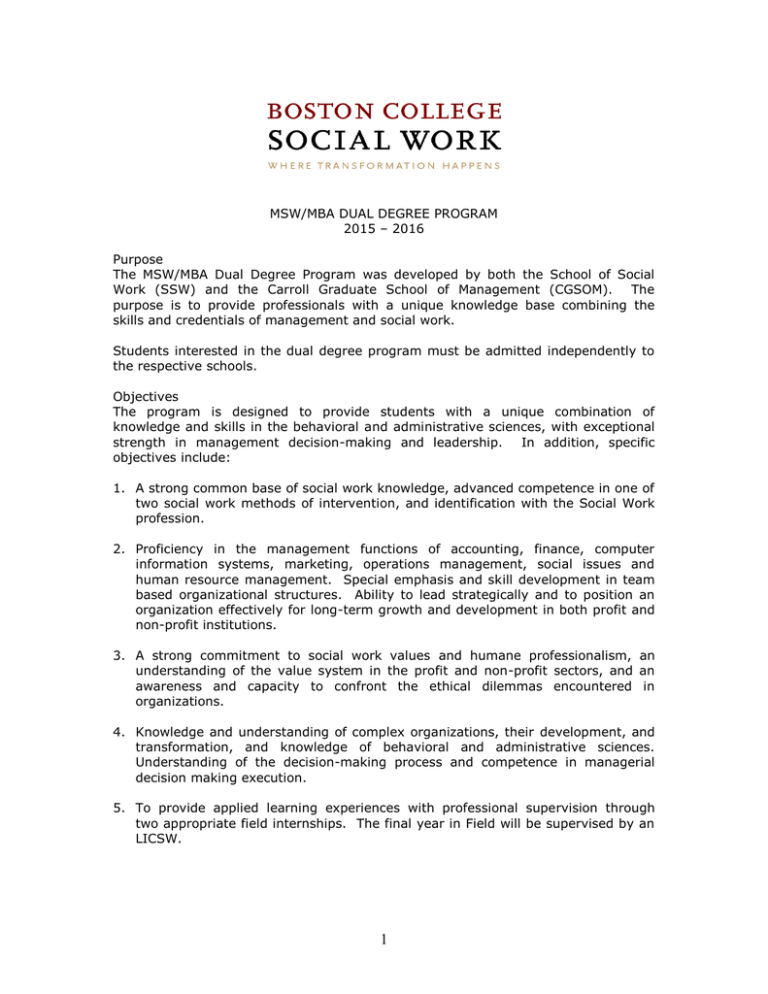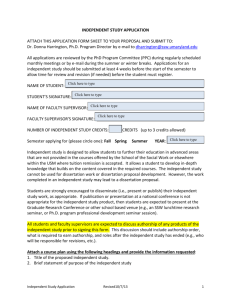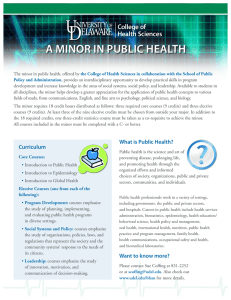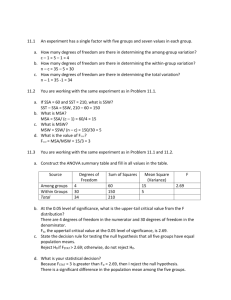Document 11160105
advertisement

MSW/MBA DUAL DEGREE PROGRAM 2015 – 2016 Purpose The MSW/MBA Dual Degree Program was developed by both the School of Social Work (SSW) and the Carroll Graduate School of Management (CGSOM). The purpose is to provide professionals with a unique knowledge base combining the skills and credentials of management and social work. Students interested in the dual degree program must be admitted independently to the respective schools. Objectives The program is designed to provide students with a unique combination of knowledge and skills in the behavioral and administrative sciences, with exceptional strength in management decision-making and leadership. In addition, specific objectives include: 1. A strong common base of social work knowledge, advanced competence in one of two social work methods of intervention, and identification with the Social Work profession. 2. Proficiency in the management functions of accounting, finance, computer information systems, marketing, operations management, social issues and human resource management. Special emphasis and skill development in team based organizational structures. Ability to lead strategically and to position an organization effectively for long-term growth and development in both profit and non-profit institutions. 3. A strong commitment to social work values and humane professionalism, an understanding of the value system in the profit and non-profit sectors, and an awareness and capacity to confront the ethical dilemmas encountered in organizations. 4. Knowledge and understanding of complex organizations, their development, and transformation, and knowledge of behavioral and administrative sciences. Understanding of the decision-making process and competence in managerial decision making execution. 5. To provide applied learning experiences with professional supervision through two appropriate field internships. The final year in Field will be supervised by an LICSW. 1 Intervention Methods In the School of Social Work students must choose an intervention method: clinical social practice or macro practice. Clinical students focus on practice directly with individuals, families, and groups in dealing with personal, interpersonal, and social problems. Macro students develop specific knowledge and skills to achieve change in organizational and community settings. Field-of-Practice Concentration Prior to entering the 3rd year, students will choose a field-of-practice concentration from one of the following areas: Children, Youth, & Families, Health & Mental Health, Older Adults & Families, or Individualized. Dual degree students are not eligible to take the Global Practice concentration because of the required full-time Spring field placement. Course of Study In broad outline, the course of study for the MSW/MBA dual degree calls for three years of study structured as follows: Year 1: Complete the core curriculum at the School of Social Work, which includes a two-day per week field practicum. Year 2: Complete the core curriculum at the Carroll Graduate Management. No field practicum is required in year two. School of Summer between Yr. 2 & 3: Complete two SSW electives. Year 3: Complete the course requirements of each school - one core course and three electives in CGSOM, four core courses in SSW. The remaining credit requirements are completed by a three-day per week social work field practicum (or student may begin the practicum in August for five days per week over four weeks and continue two days per week during the academic year). Note: It is also possible to begin the MSW Program on a part-time basis, completing the first full-time MSW curriculum over two part-time years, and thereby completing both degrees in four years. SSW requires 65 credits for the MSW degree and accepts 9 credit hours from the MBA program for elective credits. The CGSOM requires 59 credits for the MBA degree and accepts 12 credit hours from the MSW program for elective credits enabling the student to complete two full master’s programs in three years. Dual degree students complete the requirements for both degrees with a total of 103 credits rather than 124 credits if taken independently. SSW Field Placement The student will work closely with a faculty advisor and/or coordinator from SSW to discuss an appropriate practicum placement, which will provide opportunities for practice integration of social work and management knowledge and skills. 2 In lieu of the three-day per week placement in the third year, a student may begin fieldwork in August at five days per week for four weeks, and then continue two days per week during the academic year. Payment schedule Year 1: Register through and pay tuition and fees of the school in which you enroll (typically SSW). Year 2: Register through and pay tuition and fees of the second school (typically CGSOM). Summer Between Yr. 2 & 3: Register through and pay tuition and fees to the SSW. Year 3 (Fall Semester): Register through and pay tuition and fees to the CGSOM. Year 3 (Spring Semester): Register through and pay tuition and fees to the SSW. Graduate Assistantships Graduate Assistantships and Scholarships are available to CGSOM students for the two semesters and one summer session in which they are enrolled. Assistantships and scholarships are merit-based awards and are made only at the time of admission. Applicants must indicate interest in receiving merit-based funding on the application. Graduate Assistantships are available to SSW students only in the third year of the dual degree program. Applications are available in the latter half of the spring semester and can be located in the SSW admissions office. Key Administration Contacts: SSW: Tom Walsh, Associate Dean, McGuinn 133, 617-552-3338, thomas.walsh.3@bc.edu CGSOM: Shelley Burt, Head of Admissions, Fulton 315, 617-552-3920, burtsh@bc.edu Maryellen Jordan Head of Program Operations, 617- 552-2327, maryellen.jordan@bc.edu Field Placement Contacts: Joe McLaughlin, Field Placement Specialist, (617) 552-0831 or joe.mclaughlin.2@bc.edu 3 Breakdown of each year’s course requirements. MSW/MBA Year One (Clinical or Macro) First Year: Social Work Foundation Course # SCWK7721 Fall Course Name Human Behavior and the Social Environment Credits 3 Course # SCWK7722 or SCWK8833 SCWK7723 Diversity and Cross-Cultural Issues 3 SCWK8855 or SCWK8886 SCWK7762 Basic Skills in Clinical Social Work 3 SCWK8800 Basic Skills in Macro Social Work Field Education I 3 SCWK8856 or SCWK8889 SCWK7701 SCWK9921 Total 3 SCWK9932 or SCWK9942 15 Spring Course Name Psychosocial Pathology (Clinical) or Leadership and Social Transformation (Macro) Clinical Practice: Children & Families (Clinical) or Financial Management and Resource Development (Macro) Clinical Practice with Adults (Clinical) or Social Innovation (Macro) Social Welfare System Credits 3 3 3 3 Field Education II 3 Total 15 MSW/MBA Year Two Second Year: Management Foundation Fall Course # MGMT7701 Course Name Spring Credits Course # Course Name Credits 3 2 2 MPRX7730 2 OPER7720 OPER7725 Introduction to Strategic Management Communication Skills for Managers Statistics 2 MGMT7710 MFIN7701 MFIN7701 Economics Accounting 2 2 GSOM7742 MGMT7750 MGMT7712 Managing People & Organizations Analytics for Managers Marketing IT Management Financial Management Total 2 GSOM7744 Management Practice: Acting in Organizations Operations Management Strategic Management Core Elective #1 Global Capitalism, Culture, and Ethics Core Elective #2 2 GSOM7744 Core Elective #3 GSOM7710 OPER7716 MKTG7720 ISYS7720 MFIN7722 2 2 2 2 2 2 2 2 20 Total 4 15 Summer (SSW Electives) Course # SCWKxxxx SCWKxxxx Summer Course Name Social Work Elective Social Work Elective Total Credits 3 3 6 MSW/MBA Year Three (Clinical or Macro) Third Year: Combined Course # MPRX7740 SCWK7747 SCWKxxxx SCWK9933 or SCWK9943 Fall Course Name Management Practice: Entrepreneurship & Business Planning Research Methods Advanced Practice from Concentration CGSOM Elective Field Education III Total Credits 3 3 3 3 4 Course # SCWKxxxx SCWK8841 SCWK9934 or SCWK9944 16 Spring Course Name GSOM Elective GSOM Elective Advanced Policy from Concentration Program Evaluation Field Education IV Total 5 Credits 3 3 3 3 4 16


